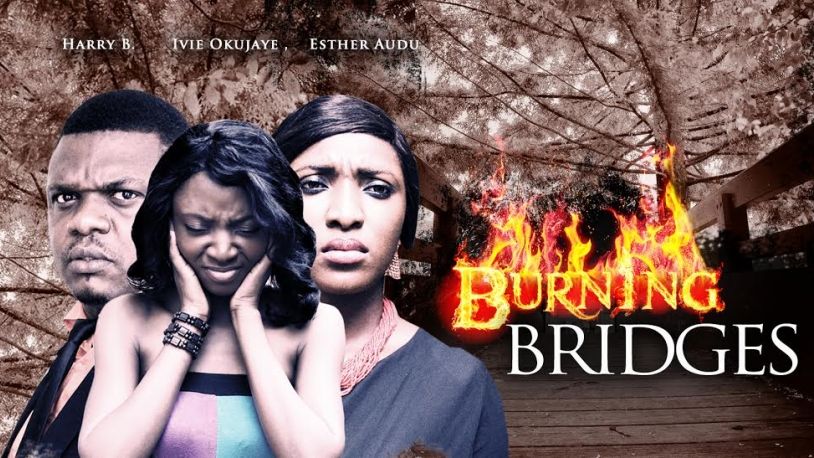Directed by Okey Ozu, Burning Bridges (2015) is a Nigerian film, though its central conflict is certainly common across all cultures.
Rose (Ivie Okujaye) and Louis (Ken Erics) have known each other for a short time, but in that short time they have grown very fond of one another. They are in love and plan to marry. There’s just one hiccup: Louis’s best friend is a woman, Terry (Esther Audu).
Is it really possible for Louis to be so close to a female friend without becoming more than a friend? Here is where the major conflict lies in Burning Bridges.
As the movie follows Rose and Louis’s relationship, it also follows Louis’s relationship with Terry. Rose’s friends and family have an inkling that her relationship with her new husband will not pan out and that his close friendship with Terry will prevent their marriage to function.
Terry knows all sorts of things about Louis–what time he has his first meal during the day, how he likes his stew. These are little tidbits that frustrate Rose–she should be the one who knows her husband more than he knows himself, not Terry.
As Rose’s impatience mounts, so does the tension between Rose and Louis, and not without reason. On more than one occasion, Terry and Louis cross boundaries with their relationship that go beyond friendship. It is no wonder that Rose gets upset.
In the end, their marriage is truly tested by Rose’s insecurity, Louis’s infidelity, and the temptation brought about by a third person lingering alongisde a dyad.

Although the acting is compelling–the actors deliver their lines with a natural edge that makes it easy to settle down with the narrative–the writing suffers from an intense spell of laziness.
Nollywood films are notorious for using loosely written outlines in the place of scripts, while relying heavily on adlibbing. But too often throughout Burning Bridges, in critical moments where dialogue is necessary to validate the assumptions of the plot, conversation is replaced with loud music over mumbling.
Words themselves can make or break movies, but even with a 2 1/2 hour run-time, these necessary words of dialogue and conversation are omitted.
The audience is expected to trust that, for example, Louis and Terry are bonding in conversation or Louis is having an intense business meeting. Though in the first meeting between Louis and Terry, no meaningful words are exchanged, only smiles, giggles, and unintelligible mutters. Throughout the film, business is a vague substitute for typing on a laptop, going to lunch dressed in fancy clothing, and setting meetings. There is no indication that the characters nor the filmmakers have any understanding of what “business” or a deep conversation truly ensues. For these reasons, the film struggles to find traction with substance.
Nollywood films continue to be churned out by the minute, and likely because so many directors and writers lack the impetus to spend time getting the details, including the dialogue, precisely right. Without these intricacies, the Burning Bridges Nigerian film cannot be elevated to a greater status than a melodramatic soap opera.
The depth lies in the details; it would benefit audiences far more if these films started taking them seriously.











You are right! This was a god film to watch, only the dialogue suffered from profuse laziness. I totally agree that if African filmmakers can concentrate on dialogue a whole lot more, clean it up and take language the way our forefathers took it seriously – in the spirit of the Jali or Griots of Africa – African film will surpass its counterparts in the world.
African Film is going places but an attention needs to be paid to this ‘in the first meeting between Louis and Terry, no meaningful words are
exchanged, only smiles, giggles, and unintelligible mutters. Throughout
the film, business is a vague substitute for typing on a laptop, going
to lunch dressed in fancy clothing, and setting meetings. There is no
indication that the characters nor the filmmakers have any understanding
of what “business”!’
That is a lack of research or the willing to do it. Either as a result of laziness or technical absenteeism. Both of which are killing the progress of African film.
Thanks for this insightful review of ‘Burning Bridges’!
I enjoyed Burning Bridges just as mush as you did. Nonetheless, I feel there were glaring rooms for improvement.
LOVE THIS MOVIE. LESSON LEARNED HERE IS DEFINITELY TRUST NO ONE!
I watched Burning Bridges and it made me want to burn a bridge, too. So I took some matches, but my local bridge would not catch on fire. It is made of steel. Hmm. “What to do?” I wondered. Then I farted. Yes, I farted! Just like that! It was a very good fart. It smelt like a dog-fart, even though I did not lick my asshole. That was a long time ago; last Tuesday in fact. Now I eat soup.
I watched this movie in 2016.
This movie spoke to me because I was the wife!! I used to be so insecure but this movie changed my Perspective.
If it werent for my belief in God, this movie would’ve justified my behavior by the Husband’s choice to leave his wife for his best friend. But through Prayer in my own situation, I realized that the wife pushed him.into the arms of his best friend. The more she spoke of his feelings for the other woman the more it made him curious to explore them until finally temptation took over. The Bible teaches us that our thoughts and feelings can lead to action if we dont check them and surrender them to God in Prayer. The seed of our thoughts come from Our enemy , hence the wife and her own insecurities that changed her Husband’s thoughts which led to his infidelity. Self Sabotage is Real and she literally destroyed her own Marriage!! I realized that being insecure only hurt me and I stopped thinking negative until my husband gave me a real reason to feel that way. Sometimes we are our worst enemies!!!